#pushkar mela
Explore tagged Tumblr posts
Text
A Traveler's guide to Puskar Mela
Unlock the essence of the vibrant Puskar Mela with our Traveler's Guide. Immerse yourself in the cultural extravaganza of Puskar Mela, where traditions come alive. Plan your journey with our guide for an authentic and unforgettable experience at the heart of Puskar Mela.

0 notes
Text
देवीधुरा स्थित मां वाराही धाम में लगने वाले प्रसिद्ध बगवाल मेले में मुख्यमंत्री धामी ने किया प्रतिभाग, की कई घोषणा
चंपावत : मुख्यमंत्री पुष्कर सिंह धामी ने चंपावत जिले के देवीधुरा स्थित मां वाराही धाम में लगने वाले प्रसिद्ध बगवाल मेले में प्रतिभाग किया और विधि-विधान से पूजा-अर्चना कर राज्य की खुशहाली की कामना की। इस दौरान मुख्यमंत्री ने मेला स्थल में लगाए गए विभिन्न विभागों के सरकारी स्टालों का निरीक्षण किया। उन्होंने अधिकारियों से जानकारी लेते हुए निर्देश दिये कि प्रत्येक जनमानस तक सरकार की विभिन्न विकास…

View On WordPress
#Bagwal Mela#Barahi Temple Committee Patron Laxman Singh Lamgadia#BJP District President Nirmal Mehra#Block Head Sumanata#Champawat#Chief Minister Pushkar Singh Dhami#Devidhura#District Magistrate Navneet Pandey#former MLA Puran Singh Fartyal#Maa Varahi Dham#news#Prime Minister Narendra Modi#uttarakhand#Zila Panchayat President Jyoti Rai
0 notes
Text

Pushkar Mela 2024

Pushkar Mela has introduced several new attractions to captivate visitors

Rajasthan Camels Race

celebration of the rich cultural heritage of Rajasthan.

Pilgrims and devotees flock to the lake to take a holy dip, perform religious rituals, and pay their respects at the numerous temples along the ghats.
showcase the traditional customs, practices, and artistic expressions that have been passed down through generations.
3 notes
·
View notes
Text
The Nath Yogis
From: Embodying the Formless: Spiritual Practice in the Nath Sampraday
Photography: Sriram Sabhapathy Curation and Captions: Kartikay Khetarpa Source: Sahapedia
The Nāth Sampradāya today comprises an order of renunciate ascetics and a householder caste, both of which trace their lineages to a group of nine Nāth gurus headed by Ādinātha (“First Nāth”), who is identified with the god Śiva. Next in most lists of nine Nāths comes Matsyendranātha, followed by Goraksanātha (Gorakhnāth), who is ̣ said to have founded the Nāth order of ascetics. he earliest references to the Nāth ascetic order as an organized entity date to the beginning of the 17th century, but its irst historical gurus, Matsyendranātha and Goraksanātha, lived much earlier, probably in the 9th and 12th centuries, respectively, and during the intermediate period there are numerous references to both ascetic and householder Nāths in texts, inscriptions, iconography, and historical reports.
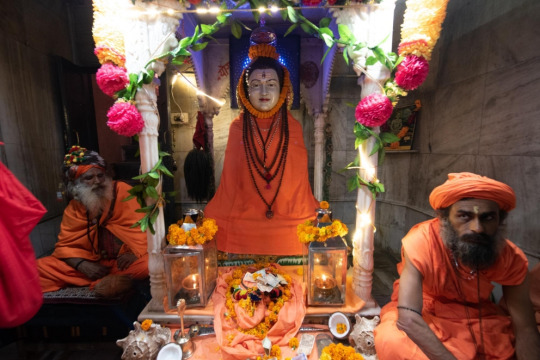
"An idol of Gorakhnath at the Jwalamukhi Shaktipeeth in Himachal Pradesh. Perhaps the most important figure in the tradition, Gorakhnath features in many popular Hindu legends. According to one such story, which is often connected to the origin of the sampraday, he is said to have ‘saved’ his guru Matsyendranath (who is believed to have been a direct disciple of Shiva) from the land of women where he gets entangled in worldly pursuits. Gorakhnath, his disciple, eventually rescues him and exhorts him to return to his original renunciant condition, setting up the Nath sampraday in the process."
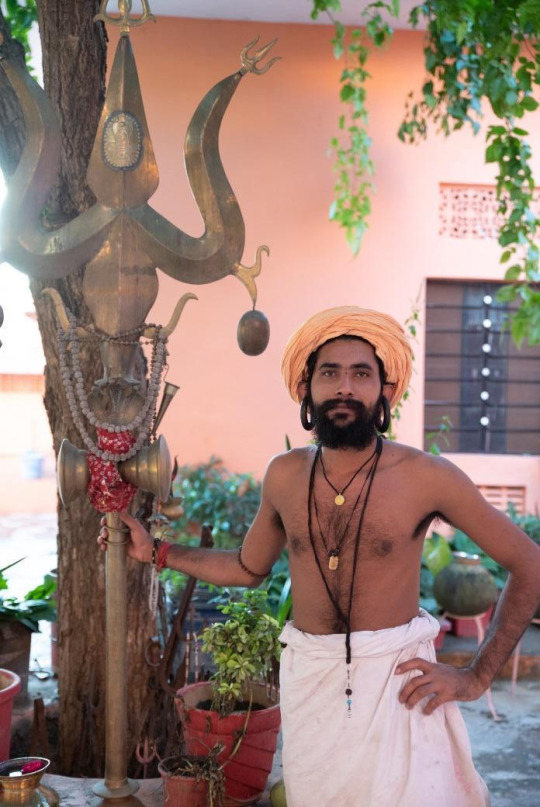
"A Nath yogi at the Shri Gorakshnath Mandir (Barah Panth Dalicha) at Pushkar. Pushkar is an important center for the Naths with separate mathas for both the ascetic as well as the householder branch of the sampraday. A mela or festival is organized here every year on the Kartik Purnima (full moon of the Kartik month of the Hindu calendar) which is attended by hundreds of Nath ascetics travelling from all parts of the country."
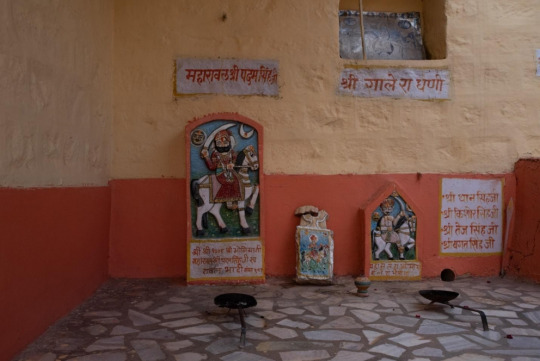
"Shrines to local folk deities at a Nath matha in Pokhran. Nath mathas can either be panchayati (communal) or niji (private). The panchayati mathas are centres for the ramta ascetics to congregate on festivals of importance and for elections of leaders. They are much fewer in number in comparison to the niji mathas which generally come up around the figure of charismatic Nath ascetics and have an independent mode of functioning. In Rajasthan, apart from gurus and deities associated with the Nath sampraday, such mathas also often house shrines dedicated to local heroes and folk deities."
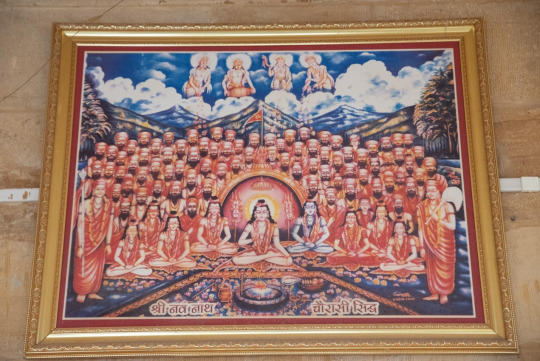
A depiction of the Navnaths and the 84 siddhas at the Guru Gorakhnath-ji matha in Myajlar (Jaisalmer). The Navnaths are revered alongside the 84 siddhas (an archetype that in some sense symbolizes all individuals who are able to achieve spiritual perfection in their lifetime).
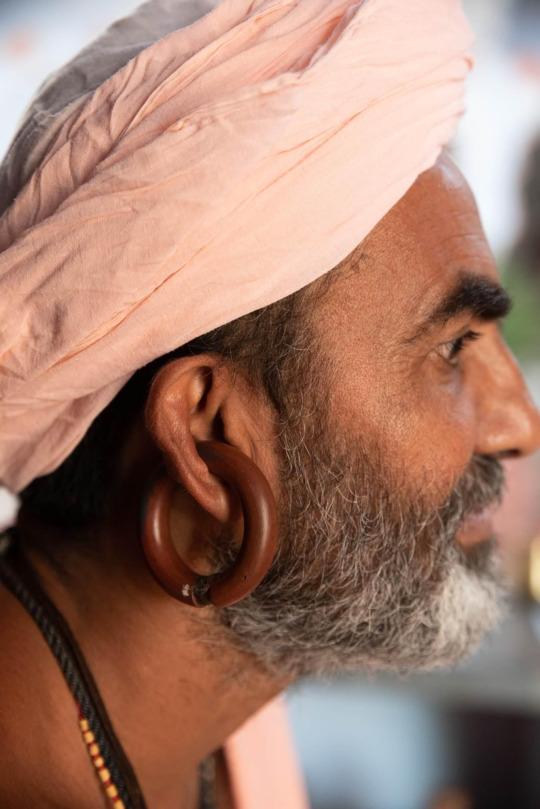
"A defining attribute of Nath ascetics are the large round earrings that many of them wear. Also known as the darshan mudra or kundal, these earrings are worn through the cartilage (not the lobe) and can be made of wood, horn, gold, silver or any other material preferred by the yogi. The ear-splitting ritual is performed only after a Nath initiate has spent considerable time as an apprentice. Comparable to a second birth, it is also treated as testimony to the initiate’s spiritual perfection.'
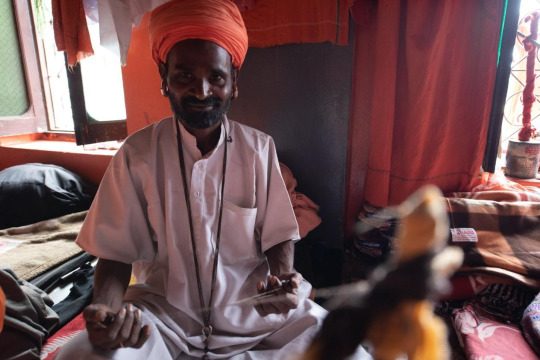
"A Nath yogi working on preparing the seli."
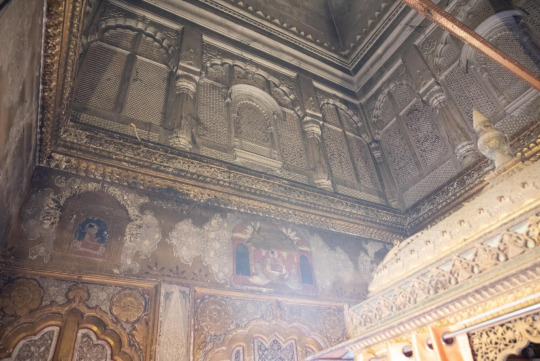
"The Naths in Rajasthan are said to have sustained a flourishing relationship with royalty who often bestowed land grants and other munificient giftson them in regard for their supernatural powers. The lavish interior of the Mahamandir is an indication of this."
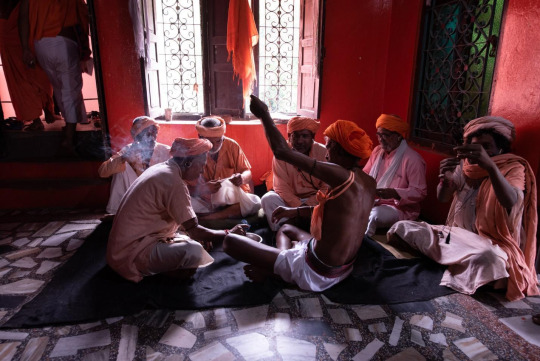
"This is also the time when the ramta Nath ascetics travel to the temple. Hundreds of them gather at the Gorakh Dibbi which is a separate section of the temple governed by the Naths. A special religious ceremony is performed here at this time of the year."
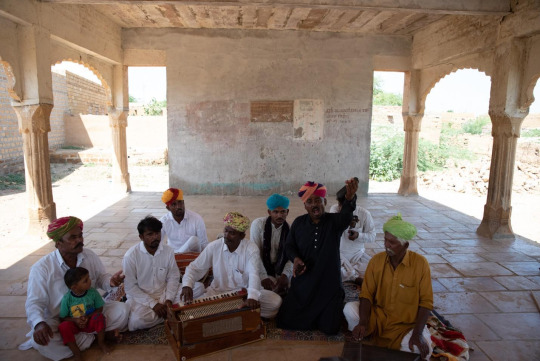
"A Manganiyar family in Kanoi (Jaisalmer) sings from their repertoire of Nath bhajans. Bhajans and kirtans are an important part of the devotional life of the Naths. In Rajasthan, while Nath bards themselves perform the epic tales of their ascetics, heroes and kings, on many occasions other communities, including the Muslim Manganiyars, are also invited to Nath gatherings and mathas to sing from their repertoires, which can relate either to the Nath sampraday specifically or to the larger nirgun bhakti tradition in the region."
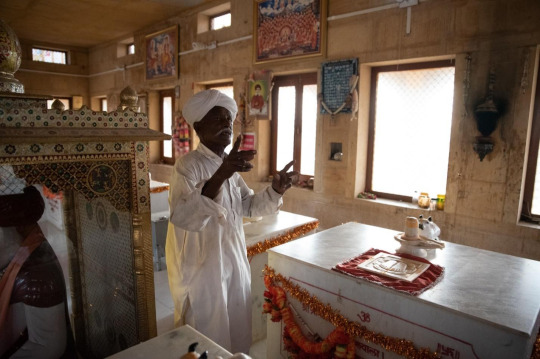
"Amolakhram ji, an elderly from the Meghwal community, recites bhajans associated with both the Sant and the Nath traditions. As he sings, he plays the tandoora (an instrument akin to the veena) with his right hand, and a jhinjha (wooden hand cymbals) with his left. The Sant and the Nath traditions draw from as well as compete with each other in the Rajasthani public sphere. While both tend to emphasize nirgun bhakti, one can often also come across songs that are written as dialogues of one-upmanship between a prominent Nath figure like Gorakhnath and a prominent Sant like Kabir. Where the loyalties of the singer or the patron lie is what generally determines the outcome of such a parley."
#Nath Sampraday#Rajasthan#Photography#Religion#Bhakti#Yogi#Gorakhnath#India#Sant#Nath#Shrine#Indic#Tradition#Asia#personal archive
3 notes
·
View notes
Text
[ad_1] Paromita Das GG News Bureau New Delhi, 11th Jan. Uttarakhand Chief Minister Pushkar Singh Dhami has captured national attention with his announcement to implement the Uniform Civil Code (UCC) in the state within this month. Speaking at the 29th Uttarayani Mela in Bareilly, Dhami reaffirmed his government’s commitment to this historic reform, invoking the vision of Dr. B.R. Ambedkar, who had originally included the provision for UCC under Article 44 of the Bharatiya Constitution. Dhami’s declaration comes at a time when the debate over UCC is gaining momentum nationwide, with proponents hailing it as a necessary step for equality and unity, and opponents warning of potential socio-political challenges. Uttarakhand’s bold move is set to become a landmark moment in Bharat’s journey towards achieving a Uniform Civil Code. The Significance of UCC: Bridging Legal and Social Divides The Uniform Civil Code, enshrined as a Directive Principle under Article 44 of the Bharatiya Constitution, aims to replace personal laws based on religious customs with a common set of laws governing civil matters like marriage, divorce, inheritance, and adoption. The idea is to create a uniform framework that upholds gender equality, eliminates religious discrimination, and strengthens Bharat’s secular fabric. Prime Minister Narendra Modi has been a vocal advocate for the UCC, emphasizing its necessity in fostering equality and modernity. In his Independence Day speech, PM Modi highlighted how UCC aligns with the principles of secularism and urged the nation to move past communal resistance to embrace this reform. Uttarakhand: Pioneering UCC Implementation Uttarakhand’s announcement to implement the UCC underscores the state’s role as a testing ground for this transformative policy. The BJP government in the state has formed a high-level committee to draft the UCC, taking into account the views of diverse stakeholders, including religious groups, women’s organizations, and legal experts. CM Pushkar Singh Dhami reiterated that UCC is not about undermining religious practices but about ensuring equality and justice for all citizens. Invoking the legacy of Dr. Ambedkar, he reminded the audience that the framers of the Constitution envisioned a unified legal framework to strengthen national unity and eliminate inequities arising from personal laws. Uttarakhand’s move also ties into the BJP’s phased approach to introducing UCC across the country. By implementing it in states first, the party aims to demonstrate its feasibility and address concerns before taking it to a national level. UCC and its Implications for Bharat The implementation of UCC has far-reaching implications for Bharat, both legally and socially. It seeks to address the following key issues: Gender Equality: Personal laws in Bharat often discriminate against women, particularly in matters of inheritance, divorce, and custody. UCC offers an opportunity to create laws that ensure equal rights for all genders, regardless of religious affiliation. National Unity: A common civil code eliminates disparities created by religious laws, fostering a sense of unity and shared identity among citizens. Modernization of Laws: Many personal laws are rooted in archaic practices. UCC provides an avenue to modernize legal frameworks and make them more relevant to contemporary societal values. However, critics argue that implementing UCC could alienate certain religious communities and disrupt social harmony. The challenge lies in striking a balance between legal uniformity and respecting cultural diversity. Challenges Ahead for Uttarakhand While Uttarakhand’s initiative is commendable, the implementation of UCC is not without challenges. Resistance from religious groups, fears of cultural erasure, and logistical hurdles in aligning diverse practices under a unified framework are significant obstacles. The state must ensure that the drafting process is inclusive, transparent, and sensitive to the concerns of all communities.
Public consultations and awareness campaigns will be crucial in gaining trust and building consensus. Additionally, the government must prepare for potential legal challenges and opposition at both state and national levels. The Broader Vision: UCC in Bharat’s National Agenda Uttarakhand’s step towards UCC aligns with the BJP’s larger vision of implementing the reform across the country. The party has consistently advocated for UCC as a means to uphold constitutional values of equality and secularism. By introducing UCC in a phased manner, starting with BJP-ruled states, the government aims to build momentum and address implementation challenges iteratively. The phased approach also allows for lessons to be learned from early adopters like Uttarakhand, enabling refinements before rolling out the policy nationally. This strategy reflects a pragmatic approach to a reform that has long been mired in political and ideological debates. UCC as a Catalyst for Modern Bharat The Uniform Civil Code represents a turning point in Bharat’s legal and social evolution. At its core, UCC is about ensuring that every citizen, regardless of their religion or gender, is treated equally under the law. Uttarakhand’s move is both bold and necessary. By taking this step, the state not only reaffirms its commitment to constitutional principles but also sets an example for the rest of the country. However, the success of UCC depends on how it is implemented—whether it is inclusive, sensitive, and grounded in the realities of Bharat’s diverse society. Critics often argue that UCC threatens religious freedoms, but this perspective overlooks the broader aim of the reform: to create a legal framework that prioritizes equality and justice over outdated practices. Bharat’s strength lies in its diversity, and UCC does not seek to erase that but rather to ensure that diversity operates within the bounds of equity and fairness. Conclusion: Uttarakhand as a Trailblazer for UCC As Uttarakhand prepares to implement the Uniform Civil Code, it marks a significant milestone in Bharat’s journey toward legal and social modernization. The state’s commitment to inclusivity and equality reflects the vision of leaders like Dr. B.R. Ambedkar, who championed the idea of a unified legal framework. While challenges are inevitable, Uttarakhand’s move is a step in the right direction, offering valuable insights for other states and the nation as a whole. The success of UCC in Uttarakhand could pave the way for its adoption across Bharat, bringing the country closer to its constitutional ideals of justice, equality, and unity. In the words of CM Pushkar Singh Dhami, “UCC is not about taking away anyone’s rights but about ensuring equal rights for all.” If implemented thoughtfully, this reform could be a cornerstone in building a more inclusive and equitable Bharat. The post Uttarakhand Leads the Way: A Bold Step Towards Implementing Uniform Civil Code in Bharat appeared first on Global Governance News- Asia's First Bilingual News portal for Global News and Updates. [ad_2] Source link
0 notes
Text
[ad_1] Paromita Das GG News Bureau New Delhi, 11th Jan. Uttarakhand Chief Minister Pushkar Singh Dhami has captured national attention with his announcement to implement the Uniform Civil Code (UCC) in the state within this month. Speaking at the 29th Uttarayani Mela in Bareilly, Dhami reaffirmed his government’s commitment to this historic reform, invoking the vision of Dr. B.R. Ambedkar, who had originally included the provision for UCC under Article 44 of the Bharatiya Constitution. Dhami’s declaration comes at a time when the debate over UCC is gaining momentum nationwide, with proponents hailing it as a necessary step for equality and unity, and opponents warning of potential socio-political challenges. Uttarakhand’s bold move is set to become a landmark moment in Bharat’s journey towards achieving a Uniform Civil Code. The Significance of UCC: Bridging Legal and Social Divides The Uniform Civil Code, enshrined as a Directive Principle under Article 44 of the Bharatiya Constitution, aims to replace personal laws based on religious customs with a common set of laws governing civil matters like marriage, divorce, inheritance, and adoption. The idea is to create a uniform framework that upholds gender equality, eliminates religious discrimination, and strengthens Bharat’s secular fabric. Prime Minister Narendra Modi has been a vocal advocate for the UCC, emphasizing its necessity in fostering equality and modernity. In his Independence Day speech, PM Modi highlighted how UCC aligns with the principles of secularism and urged the nation to move past communal resistance to embrace this reform. Uttarakhand: Pioneering UCC Implementation Uttarakhand’s announcement to implement the UCC underscores the state’s role as a testing ground for this transformative policy. The BJP government in the state has formed a high-level committee to draft the UCC, taking into account the views of diverse stakeholders, including religious groups, women’s organizations, and legal experts. CM Pushkar Singh Dhami reiterated that UCC is not about undermining religious practices but about ensuring equality and justice for all citizens. Invoking the legacy of Dr. Ambedkar, he reminded the audience that the framers of the Constitution envisioned a unified legal framework to strengthen national unity and eliminate inequities arising from personal laws. Uttarakhand’s move also ties into the BJP’s phased approach to introducing UCC across the country. By implementing it in states first, the party aims to demonstrate its feasibility and address concerns before taking it to a national level. UCC and its Implications for Bharat The implementation of UCC has far-reaching implications for Bharat, both legally and socially. It seeks to address the following key issues: Gender Equality: Personal laws in Bharat often discriminate against women, particularly in matters of inheritance, divorce, and custody. UCC offers an opportunity to create laws that ensure equal rights for all genders, regardless of religious affiliation. National Unity: A common civil code eliminates disparities created by religious laws, fostering a sense of unity and shared identity among citizens. Modernization of Laws: Many personal laws are rooted in archaic practices. UCC provides an avenue to modernize legal frameworks and make them more relevant to contemporary societal values. However, critics argue that implementing UCC could alienate certain religious communities and disrupt social harmony. The challenge lies in striking a balance between legal uniformity and respecting cultural diversity. Challenges Ahead for Uttarakhand While Uttarakhand’s initiative is commendable, the implementation of UCC is not without challenges. Resistance from religious groups, fears of cultural erasure, and logistical hurdles in aligning diverse practices under a unified framework are significant obstacles. The state must ensure that the drafting process is inclusive, transparent, and sensitive to the concerns of all communities.
Public consultations and awareness campaigns will be crucial in gaining trust and building consensus. Additionally, the government must prepare for potential legal challenges and opposition at both state and national levels. The Broader Vision: UCC in Bharat’s National Agenda Uttarakhand’s step towards UCC aligns with the BJP’s larger vision of implementing the reform across the country. The party has consistently advocated for UCC as a means to uphold constitutional values of equality and secularism. By introducing UCC in a phased manner, starting with BJP-ruled states, the government aims to build momentum and address implementation challenges iteratively. The phased approach also allows for lessons to be learned from early adopters like Uttarakhand, enabling refinements before rolling out the policy nationally. This strategy reflects a pragmatic approach to a reform that has long been mired in political and ideological debates. UCC as a Catalyst for Modern Bharat The Uniform Civil Code represents a turning point in Bharat’s legal and social evolution. At its core, UCC is about ensuring that every citizen, regardless of their religion or gender, is treated equally under the law. Uttarakhand’s move is both bold and necessary. By taking this step, the state not only reaffirms its commitment to constitutional principles but also sets an example for the rest of the country. However, the success of UCC depends on how it is implemented—whether it is inclusive, sensitive, and grounded in the realities of Bharat’s diverse society. Critics often argue that UCC threatens religious freedoms, but this perspective overlooks the broader aim of the reform: to create a legal framework that prioritizes equality and justice over outdated practices. Bharat’s strength lies in its diversity, and UCC does not seek to erase that but rather to ensure that diversity operates within the bounds of equity and fairness. Conclusion: Uttarakhand as a Trailblazer for UCC As Uttarakhand prepares to implement the Uniform Civil Code, it marks a significant milestone in Bharat’s journey toward legal and social modernization. The state’s commitment to inclusivity and equality reflects the vision of leaders like Dr. B.R. Ambedkar, who championed the idea of a unified legal framework. While challenges are inevitable, Uttarakhand’s move is a step in the right direction, offering valuable insights for other states and the nation as a whole. The success of UCC in Uttarakhand could pave the way for its adoption across Bharat, bringing the country closer to its constitutional ideals of justice, equality, and unity. In the words of CM Pushkar Singh Dhami, “UCC is not about taking away anyone’s rights but about ensuring equal rights for all.” If implemented thoughtfully, this reform could be a cornerstone in building a more inclusive and equitable Bharat. The post Uttarakhand Leads the Way: A Bold Step Towards Implementing Uniform Civil Code in Bharat appeared first on Global Governance News- Asia's First Bilingual News portal for Global News and Updates. [ad_2] Source link
0 notes
Text

How Spices Are Celebrated in Regional Indian Fairs
Regional Indian fairs are a treasure trove of cultural heritage, where spices take center stage as symbols of tradition, flavor, and community. These fairs are more than just celebrations; they are vibrant marketplaces showcasing the rich diversity of Indian spices.
Spices at the Heart of Fairs:
Pushkar Fair (Rajasthan): Beyond camels and crafts, spices like red chillies and turmeric are sold in colorful mounds, drawing locals and tourists alike.
Sonepur Mela (Bihar): A hub for fresh ginger, garlic, and mustard seeds, this fair celebrates agricultural abundance and spice trade.
Surajkund Mela (Haryana): Known for its handicrafts, it also highlights regional spice blends and their unique culinary applications.
Kumbh Mela: Alongside spiritual rituals, spices like fennel, cumin, and asafoetida find their place in the bustling food stalls that serve traditional dishes.
Culinary Demonstrations:
Regional fairs often feature live cooking sessions where spices play the lead role. From spiced jalebis to tangy chaats, these fairs highlight how spices transform everyday ingredients into culinary masterpieces.
Why Choose Dilhar: At Dilhar Spices, we are inspired by the vibrant spice culture celebrated in Indian fairs. Our products bring the same authenticity and freshness that resonate in these festivals, ensuring you experience regional flavors in your own kitchen.
Conclusion: Indian fairs are a vibrant celebration of spices, showcasing their integral role in food, culture, and trade. With Dilhar Spices, you can bring home the essence of these regional festivities, adding a touch of tradition and authenticity to your cooking. Explore the flavors of India, one fair-inspired dish at a time!
0 notes
Text
Exploring the Renowned Camel Fair of Pushkar during Your Golden Triangle Tour
If you plan a Golden Triangle tour in India, adding the Pushkar Camel Fair to your itinerary is an unforgettable experience. This vibrant festival occurs annually in Pushkar, Rajasthan, and is one of the world's largest and most famous camel fairs. It offers a rare opportunity to experience the colorful culture of Rajasthan, its rich traditions, and the bustling life of rural India.
What is the Pushkar Camel Fair?
The Pushkar Camel Fair, also called the Pushkar Mela, Camel Fair in Bikaner: A Unique Rajasthan Experience, is unique and attracts thousands of visitors every year. Usually, it takes place in November. The fair is a mixture of commerce, spirituality, and cultural festivities. Originally, it was a cattle fair where farmers and traders used to come to buy and sell camels, cattle, and other livestock. Still, over the years, it has become a grand celebration involving religious rituals, music, dance, and competitions.
The Vibrancy of the Fair
Rajasthan Village Tour with Travelage India—A Journey into Rural Heritage Among other features of the Pushkar Camel Fair is the spectacle of thousands of camels marching into the fairgrounds dressed in colorful blankets with glittering jewelry, awaiting the time to be traded or offered as a gift. Other animals include horses and other forms of livestock sold for a price or traded out for other goods.
Besides the animal trade, the fair allows visitors to experience the local culture. Folk music and dance performances are rampant, and the streets are lined with stalls selling handicrafts, textiles, jewelry, and souvenirs. The grounds also host camel races and other competitions, such as the "best-decorated camel" contest, where owners compete for the title with their elaborately adorned animals.
Spiritual Significance
Pushkar Fair: History, origin, and Cultural Tradition is a religious town, with the sole Brahma Temple in existence and a sacred lake revered by pilgrims across the length and breadth of India. Hundreds of devotees come there to take a holy bath in Pushkar Lake, cleanse their sins, and obtain holy blessings. Suppose you are a visitor to the Golden Triangle tour. In that case, you can also discover the spiritual aspect of the fair, as the religious rituals provide a serene contrast to the vivacious celebrations.
Why to Visit Camel Fair?
The Pushkar Camel Fair makes the perfect add-on for your Golden Triangle tour by giving you an insight into Rajasthan's unique desert culture, traditions, and spirituality. Whether you're a history enthusiast, culture seeker, or someone who wants a travel experience unlike any other in India, this fair will provide you with a richness of experience unmatched anywhere in India.
0 notes
Text
मुख्यमंत्री ने दिए निर्देश कावड़ यात्रा मार्ग के साथ पार्किग स्थलों पर साइनेज, स्वच्छता एवं पेयजल आदि का हो कारगर प्रबंध
हरिद्वार:- मुख्यमंत्री पुष्कर सिंह धामी की अध्यक्षता में सोमवार को मेला नियंत्रण भवन (सी0सी0आर0) हरिद्वार में कांवड़ यात्रा-2023 की तैयारियों के सम्बन्ध में जन-प्रतिनिधियों, शासन के उच्चाधिकारियों एवं जिला स्तर के अधिकारियों के साथ उच्च स्तरीय गहन समीक्षा बैठक आयोजित हुई। समीक्षा बैठक में मुख्यमंत्री पुष्कर सिंह धामी ने अधिकारियों को कावड़ मेला आरंभ होने से पूर्व सभी आवश्यक व्यवस्थायें…
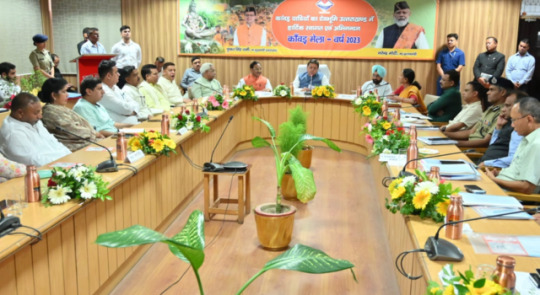
View On WordPress
#Additional Chief Secretary Radha Raturi#Anand Vardhan#Chief Minister Pushkar Singh#Chief Secretary Dr. SS Sandhu#haridwar#Kavad Mela#news#Principal Secretary RK Sudhanshu#Secretary Chief Minister Vinay Shankar Pandey#Secretary Dr. R. Rajesh Kumar#uttarakhand
0 notes
Text
Join Pushkar Mela 2024

Planning a trip to Pushkar to join Pushkar mela 2024? Book Tempo Traveller on rent to surprise your loved ones. Book 9 to 12 seater tempo traveller for family trip while for corporate outings, 16 to 20 seater traveller is perfect.
Visitors can enjoy traditional Rajasthani music, dance performances and various cultural exhibitions that showcase the rich heritage of the state. Get unlimited fun in unique competitions as Long Moustache Contest, Turban Tying Competition and Matka Race. Do not miss trying local delicacies like Dal Baati Churma and Malpua available at various stalls during the fair.
You can start Delhi to Pushkar trip and then head to Jaipur. Stroll around the city for sightseeing and adventure. Then move towards Ajmer and Pushkar. Pushkar Mela offers a unique camel and cattle fair, attracting traders and tourists from across the world. Tempo Traveller Booking facility offers maximum comfort and convenience on trip.
#tempotravellerindelhi#tempotravelleronrent#tempotravellerbooking#tempotravellerrental#delhitempotraveller
0 notes
Text
✨ Experience the Pushkar Fair 2024! ✨

Dive into Rajasthan’s iconic festival of culture, color, and cattle. From camel races and lively folk performances to spiritual dips in Pushkar Lake, this fair is a feast for the senses. A celebration of tradition and heritage, it’s the perfect blend of vibrant festivities and sacred rituals. Get ready for a journey through Rajasthan’s rich culture this November! 🐪🎶🌅
Read More:- https://www.tripzygo.in/blogs/pushkar-mela-rajasthan
1 note
·
View note
Text
Join us for an unforgettable journey into Rajasthan’s cultural heart, where tradition meets festivity. From the iconic camel fair to mesmerizing folk performances, Pushkar Mela 2024 promises a spectacle of art, culture, and spirituality. Don't miss out on this world-renowned celebration❤️🐫😍
#PushkarMela2024 #RajasthanCulture #PushkarFair #CamelFairPushkar #IncredibleIndia #RajasthanTourism #DesertFestival #CulturalExtravaganza #TravelToRajasthan #InstaRajasthan
0 notes
Text
Unraveling the Traditions Behind Pushkar Camel Fair Festival
The Pushkar Camel Fair, held annually in the sacred town of Pushkar, Rajasthan, is more than just a marketplace for trading livestock. It is a vibrant confluence of culture, tradition, and spirituality that draws thousands of visitors from across the globe. The fair, known locally as "Pushkar Mela," offers a unique experience, combining the charm of a rustic carnival with the sanctity of religious observances. This spectacular event encapsulates the true spirit of Rajasthan, where people come together to celebrate life, foster trade, and pay homage to divine deities.
0 notes
Text


Banarasi Handwoven Wedding Zari Work Border Silk Sarees - Pushkar Mela
Rs. 22,499.00
Product Details:
Banarasi pure crepe georgette saree with handwoven zari designs all over
Blouse piece - Matching blouse with coordinated borders
(as shown in last image)
The saree comes with its own blouse piece.
The one worn by the model is for styling purpose only.
Note: Colors may vary slightly from screen to screen
Ayana practises a Flat Shipping Rate concept.
Shipping rates do not change based on the weight of the total cart.
Innumerable products constitute to the same shipping cost.
If you have opted for blouse stitching,
our design team will get in touch with you
within 48 hours of order confirmation for measurements and pattern suggestions.
Note: Colors may vary slightly from screen to screen.
We Provide World-Class Design.
Wide Range of Silk Collections.
Festive Collections.
Worldwide Shipping.
Domestic Shipping All Over India.
Door Step Services Available.
Ayana practises a Flat Shipping Rate concept.
Shipping rates do not change based on the weight of the total cart.
Innumerable products constitute to the same shipping cost.
If you have opted for blouse stitching, our design team will get in
touch with you within 48 hours of order confirmation for
measurements and pattern suggestions.
House on Ayana's E-Gift Cards is a perfect &
a convenient option to express your love.
Be it any occasion, we've got you covered!
E-Gift Card is the perfect gift for Birthdays,
Anniversaries, or any other special occasion.
Let that special person in your life choices for themselves.
Gift Cards are redeemable only at
http://www.houseofayana .com,
and we're excited to be a part of anyone's BIG DAY!
Happy Shopping.!:)
#Banarasi Handwoven Wedding Zari Work Border Silk Sarees#Soft Silk Sarees#Light Weight Silk Sarees#Bridal Wear Silk Sarees#Traditional Silk Sarees#Elite Silk Sarees#Classic Silk Sarees#Premium Silk Sarees#Luxury Silk Sarees#Pattu Sarees#Party Wear Silk Sarees#Occasion Wear Silk Sarees
0 notes
Text
The Pushkar Camel Fair: A Unique Blend of Culture and Commerce

Nestled in the vibrant desert state of Rajasthan, India, the Pushkar Camel Fair stands as a testament to the rich cultural heritage and lively commerce that characterizes the region. Held annually in the small town of Pushkar, this fair is not just a market; it’s a celebration that draws thousands of visitors from around the world. What makes the Pushkar Camel Fair truly exceptional is its unique blend of culture and commerce, providing an immersive experience that showcases the traditional lifestyle of Rajasthan’s nomadic communities alongside a bustling commercial spectacle.
A Cultural Extravaganza
The Pushkar Camel Fair, known locally as the Pushkar Mela, is an annual event that takes place in November. Its origins trace back to the 19th century when it was primarily a cattle trading fair. Today, it has evolved into a grand celebration of Rajasthani culture and tradition. During the fair, the arid landscape of Pushkar transforms into a vibrant tapestry of colors, music, and festivities. The fair attracts not only traders and buyers but also tourists eager to experience the local culture in its most authentic form.
One of the highlights of the Pushkar Camel Fair is the camel trading, which remains a central feature of the event. Thousands of camels and other livestock are brought to the fair, where traders engage in lively negotiations and transactions. The fairgrounds are adorned with colorful tents, and the air is filled with the sounds of traditional Rajasthani music and the laughter of visitors. The camels themselves are a sight to behold, often decorated with vibrant saddles and ornaments, adding to the festive atmosphere.
In addition to the camel trading, the fair features a range of cultural events and activities. Folk performances, including traditional Rajasthani dances and music, take place throughout the fair. Visitors can witness mesmerizing performances of Ghoomar and Kalbeliya dances, which are integral to Rajasthani culture. The fair also hosts a variety of competitions, such as camel beauty contests and turban-tying competitions, showcasing the skills and creativity of the local people.
Commerce Meets Tradition
The Pushkar Camel Fair is as much a commercial hub as it is a cultural extravaganza. The fairgrounds are bustling with activity as traders and vendors set up their stalls, offering a wide array of goods ranging from traditional Rajasthani handicrafts to modern accessories. Visitors can browse through colorful stalls selling everything from intricate jewelry and handcrafted textiles to traditional Rajasthani artifacts and souvenirs. The fair is an excellent opportunity for tourists to purchase unique items that capture the essence of Rajasthan’s rich heritage.
For those planning a more extended exploration of Rajasthan, incorporating the Pushkar Camel Fair into a broader travel itinerary is highly recommended. A popular option is to book a “7 Days 6 Nights Rajasthan Tour Packages,” which typically includes a visit to Pushkar as part of a comprehensive journey through the state. This type of package offers a well-rounded experience, combining the cultural and commercial highlights of the Pushkar Camel Fair with other iconic destinations in Rajasthan, such as Jaipur, Udaipur, and Jaisalmer. The tour provides a convenient way to explore the diverse attractions of Rajasthan, offering a taste of the state’s grandeur and heritage.
During a Rajasthan tour package, visitors can immerse themselves in the historical and architectural marvels of cities like Jaipur, known for its majestic forts and palaces, and Udaipur, celebrated for its serene lakes and royal residences. The package often includes guided tours, allowing travelers to gain deeper insights into the region’s history and culture. By integrating the Pushkar Camel Fair into the itinerary, travelers not only experience the unique festivities of the fair but also enjoy a comprehensive exploration of Rajasthan’s cultural and historical landscape.
A Feast for the Senses
The Pushkar Camel Fair is a feast for the senses, offering a rich array of experiences that go beyond the visual spectacle. The fair’s food stalls serve a delightful array of Rajasthani cuisine, allowing visitors to savor traditional dishes such as dal bati churma, kachori, and the famous Rajasthani sweets. The flavors of Rajasthan, with their distinctive spices and ingredients, add to the immersive experience of the fair. The aroma of sizzling street food and the vibrant colors of the local cuisine create a sensory delight for food enthusiasts.
Additionally, the fair provides a glimpse into the daily lives of the nomadic communities that flock to Pushkar for the event. Visitors have the opportunity to interact with these communities, learning about their traditional crafts, customs, and way of life. The fair serves as a platform for cultural exchange, where visitors can gain a deeper understanding of the diverse and rich traditions of Rajasthan.
The Spirit of Community
At its heart, the Pushkar Camel Fair is a celebration of community and tradition. The event brings together people from various backgrounds and regions, united by their shared cultural heritage and commercial interests. The fair fosters a sense of camaraderie among participants, from traders and locals to tourists and performers. It is a space where different cultures and traditions converge, creating a vibrant and dynamic atmosphere.
The Pushkar Camel Fair also plays a significant role in preserving and promoting Rajasthan’s cultural heritage. By attracting international attention and showcasing traditional practices, the fair helps to ensure that the region’s rich cultural legacy continues to thrive. It serves as a reminder of the importance of cultural preservation and the value of celebrating traditional practices in a rapidly changing world.
Planning Your Visit
For those interested in attending the Pushkar Camel Fair, it’s essential to plan ahead to make the most of the experience. November is the ideal time to visit, as the fair typically takes place during this month. Accommodations in Pushkar can fill up quickly during the fair, so it’s advisable to book early. Many tour operators offer packages that include accommodation, transportation, and guided tours, making it easier for visitors to navigate the event and explore the surrounding region.
In conclusion, the Pushkar Camel Fair is a unique celebration that blends culture and commerce in a captivating way. It offers a rich tapestry of experiences, from vibrant cultural performances and traditional crafts to bustling commercial activities and local cuisine. By integrating the fair into a broader Rajasthan tour package, travelers can enjoy a comprehensive exploration of the state’s diverse attractions while immersing themselves in the festive spirit of Pushkar. Whether you’re drawn by the allure of traditional Rajasthani culture or the excitement of a bustling marketplace, the Pushkar Camel Fair promises an unforgettable journey into the heart of Rajasthan.
0 notes